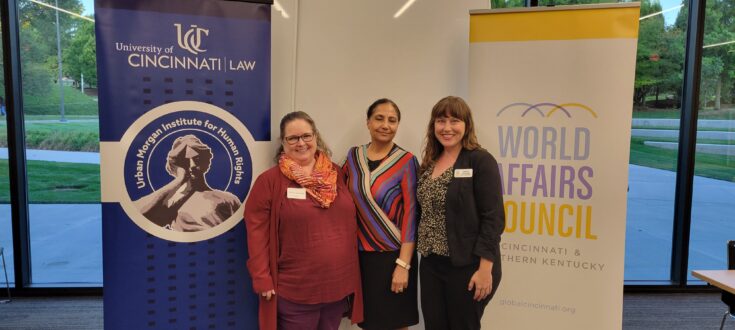Belquis Ahmadi speaks at World Affairs Event

On September 13th, the World Affairs Council partnered with DeanHouston, Winton Woods High School, Northern Kentucky University and the Urban Morgan Human Rights Institute to present Belquis Ahmadi, Senior Program Officer at the United States Institute of Peace. Belquis Ahmadi has over 20 years of experience working in Afghanistan on issues related to gender, human rights, civil society development, rule of law, governance and democracy. Ahmadi’s extensive experience includes senior management positions under large USAID programs in Afghanistan, evaluation of USAID gender and democracy and governance programming, and analysis and design of gender and human rights programming, and training and mentoring Afghan civil society and government candidates. She has also published extensively on democracy, governance and women’s rights in Afghanistan. Find her full biography here.

Belquis Ahmadi
During her presentation, Afghanistan: The Women Left Behind, Ahmadi spoke about the rights which have now been stripped away from women and girls under the rule of the Taliban. Pre-Taliban rule, women had the right to vote, they could learn languages and history, women’s rights were enshrined in the Afghani constitution, women could be in parliament, women could go to university. It was only after the the Taliban toppled the government in 1996, that women and girls their rights. Nearly 68,000 female teachers, 22% of women in the cabinet and parliament, 280 female judges, 1,000 judges, and 1,300 female entrepreneurs all lost their jobs.
These rights were further infringed upon in the past two years. Girls are not allowed to receive any education beyond the 6th grade. Women must wear the burka if they are to leave the house, which limits their vision to about 10%. Women cannot leave their homes, even to go to the corner bakery, without a male chaperone. Women have been even been banned from parks and historic sites. Nearly 60,000 women lost their remaining jobs when 13,000 beauty parlors were shut down.
She explained that these women have not gone quietly. Afghan women have gone to the streets to protest. However, their resistance has been met with being detained, tortured, beaten, and raped. They have asked to meet with Taliban leaders, but this has proved fruitless. They have called on world leaders, called for gender apartheid, and are building a case of crimes against humanity under gender persecution.
The men in their lives have not abandoned the women. Men have also protested openly, but have been met by being detained, tortured, killed, or they simply disappeared. Islamic elders went to meet with the Taliban behind closed doors. The Taliban would not entertain their pleas.
Ahmadi was clear that the Taliban projects modesty, but they are full of hypocrisy. Last year, the Taliban raided an elementary school– one of the last places that girls can get an education– and made teachers and girls with burkas raise their skirts to show that they were not wearing jeans. Despite being covered, the Taliban views jeans as a sin against the Islamic faith. Those that were found wearing jeans were then beaten with electric cables. This had to be one of the hardest testimonies to hear throughout the whole evening.
It is no wonder, then that female suicide is very, very high, especially among intelligent and well-educated women.
Ahmadi explained that Pakistan did not sign the 1961 Refugee Protocol by the UN Convention to establish safeguards against statelessness in several different contexts. Therefore, there are no checks or balances. There are no processes for undocumented immigrants. This leads to high rates of human trafficking, black market trading, and organ sales.
Currently, no country is giving Afghanis refugee visas. What this has led to is a black market to create visas. Since these passports are illegal, the cost of them ends up being exorbitant. People are taking advantage of those who are so desperate to leave their home. 1 passport can cost up to $2,000. So if a family of ten is trying to leave, they would need $20,000. On top of this, a visa costs an extra $10,000-15,000. These visas only last for three months, and the Pakistani government does not allow anyone to extend them. Families are completely unable to continue to pay this type of money. The Taliban has ensured this by freezing the bank accounts of anyone who works at an NGO.
Some families are desperate enough to travel illegally through Iran and up into Turkey.
The instability that the Taliban has created in Afghanistan can now be felt throughout the Middle East. This is the first time three countries officially recognize the Taliban as a legitimate government. These are Pakistan, the United Arab Emirates, and Saudi Arabia. There is fighting between Afghanistan and Pakistan. Tajikistan now has a Taliban movement. Uzbekistan is friendly with the Taliban. Ahmadi said that if the West does not stop the Taliban and hold them accountable, the Taliban will take over the entire region.
Fortunately, there is hope. Previously, in order to receive a P1 or P2 visa in the U.S., the Afghani individuals had to be outside of Afghanistan. This, as mentioned before, is difficult to get the money to stay and often they had to go back before they could be approved for their visa. Now, though, the U.S. State Department decided that they can do their screenings over the phone and those who qualify can be evacuated from Afghanistan and taken to Qatar, Kosovo, and Albania.
In her final remarks, Ahmadi stated that the Afghan Adjustment Act needs to be passed. Legislators need to put this on their agenda. It could save lives!
Overall, Belquis Ahmadi was incredibly moving. One of our sponsors said that it had him tearing up. Sometimes, as Americans, we get desensitized to the issues that we hear on TV. Or we move past them once the news stops covering these issues. Belquis Ahmadi brought a very passionate voice to the women that have been left behind. She is not just an expert, she has lived experience. It is important that we do not forget these women. To forget them is to condemn them to these horrendous acts of violence. I am so glad that I could hear this testimony.

Professor Bert Lockwood (left), Emily Rose (center left), Michele Mansfield (center), Belquis Ahmadi (center right), and Melissa McDonald (right).


